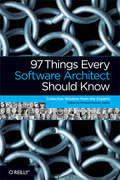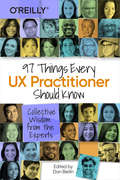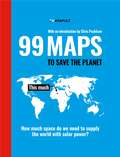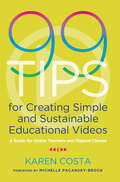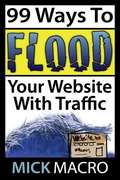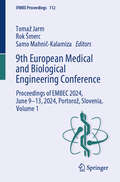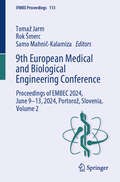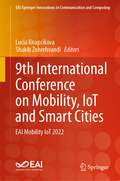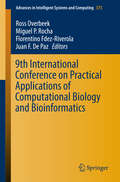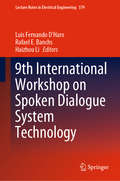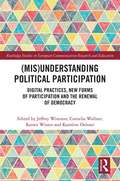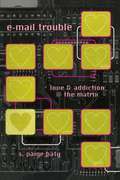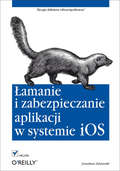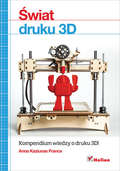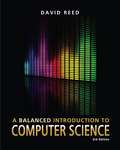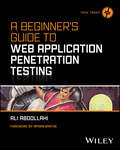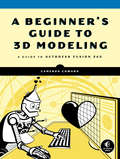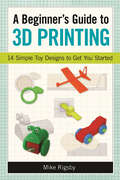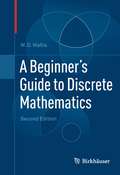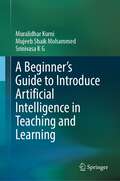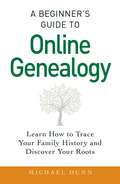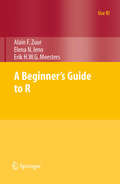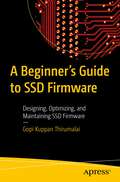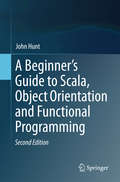- Table View
- List View
97 Things Every Software Architect Should Know: Collective Wisdom from the Experts
by Richard Monson-HaefelIn this truly unique technical book, today's leading software architects present valuable principles on key development issues that go way beyond technology. More than four dozen architects -- including Neal Ford, Michael Nygard, and Bill de hOra -- offer advice for communicating with stakeholders, eliminating complexity, empowering developers, and many more practical lessons they've learned from years of experience. Among the 97 principles in this book, you'll find useful advice such as:Don't Put Your Resume Ahead of the Requirements (Nitin Borwankar)Chances Are, Your Biggest Problem Isn't Technical (Mark Ramm)Communication Is King; Clarity and Leadership, Its Humble Servants (Mark Richards)Simplicity Before Generality, Use Before Reuse (Kevlin Henney)For the End User, the Interface Is the System (Vinayak Hegde)It's Never Too Early to Think About Performance (Rebecca Parsons)To be successful as a software architect, you need to master both business and technology. This book tells you what top software architects think is important and how they approach a project. If you want to enhance your career, 97 Things Every Software Architect Should Know is essential reading.
97 Things Every UX Practitioner Should Know
by Daniel BerlinTap into the wisdom of experts to learn what every UX practitioner needs to know. With 97 short and extremely useful articles, you'll discover new approaches to old problems, pick up road-tested best practices, and hone your skills through sound advice.Working in UX involves much more than just creating user interfaces. UX teams struggle with understanding what's important, which practices they should know deeply, and what approaches aren't helpful at all. With these 97 concise articles, editor Dan Berlin presents a wealth of advice and knowledge from experts who have practiced UX throughout their careers.Bring Themes to Exploratory Research--Shanti KanhaiDesign for Content First--Marli MesibovDesign for Universal Usability--Ann Chadwick-DiasBe Wrong on Purpose--Skyler Ray TaylorDiverse Participant Recruiting Is Critical to Authentic User Research--Megan CamposPut On Your InfoSec Hat to Improve Your Designs--Julie MeridianBoost Your Emotional Intelligence to Move from Good to Great UX--Priyama Barua
99 Maps to Save the Planet: With an introduction by Chris Packham
by KATAPULT'Terrifying yet funny, surprising yet predictable, simple yet poignant' Chris PackhamA shocking but informative, eye-catching and witty book of maps that illustrate the perilous state of our planet.The maps in this book are often shocking, sometimes amusing, and packed with essential information:· Did you know that just 67 companies worldwide are responsible for 67 per cent of global greenhouse emissions? · Or that keeping a horse has the same carbon footprint as a 23,500-kilometre road trip? · Did you know how many countries use less energy than is consumed globally by downloading porn from the internet?· Do you know how much of the earth's surface has been concreted over?· Or how many trees would we have to plant to make our planet carbon-neutral?Presenting a wealth of innovative scientific research and data in stunning, beautiful infographics, 99 Maps to Save the Planet provides us with instant snapshots of the destruction of our environment. At one glance, we can see the precarious state of our planet - but also realise how easy it would be to improve it Enlightening, a bit frightening, but definitely inspiring, 99 Maps to Save the Planet doesn't provide practical tips on how to save our planet: it just presents the facts. And the facts speak for themselves. Once we know them, what excuse do we have for failing to act?
99 Tips for Creating Simple and Sustainable Educational Videos: A Guide for Online Teachers and Flipped Classes
by Karen CostaThe research is clear: online learning works best when faculty build regular, positive, and interactive relationships with students. A strategy that helps forge such a relationship is the use of videos. Student satisfaction and course engagement levels also increase with the use of instructor-generated videos – the subject of this book.Beginning by outlining the different types of videos you can create, and what the research says about their effectiveness, Karen Costa explains how they can be designed to reinforce learning, to align with and promote course outcomes, and to save you time across your courses. She then describes how to create successful videos with commonly available technologies such as your smartphone, and without a major investment of time, demonstrating the simple steps she took to develop her bank of videos and build her confidence to deliver short, straightforward learning aids that are effective and personal.Embedded QR codes in the text enable you to view sample videos and screencasts that bring the book’s advice to life as you read.If you’ve been wanting to include videos in your teaching but haven’t found the time or confidence, this book will help you to develop a simple and sustainable video development process, supporting both your success and the success of your students.
99 Ways To Flood Your Website With Traffic
by Mick MacroThis book has helped thousands of people flood massive amounts of traffic into their websites, blogs, videos, and many other pages online, and will help you too. If you have ever wanted a complete list of every traffic strategy you need to get massive amounts of website traffic, 99 Ways To Flood Your Website With Traffic is the book for you. Not only do you get to hear about specific websites and strategies, but you also learn how to combine certain strategies to maximize your results. When you start putting all of these website traffic tips into one big traffic strategy of your own, you are able to drive traffic to your websites literally whenever you want. Discover: - How to maximize viral sharing of your sites and pages. - Easy scripts that give you free traffic every single day. - How to maximize free giveaways for success. - Free promotion and advertising sites that give you free site traffic. - Short-tail, long-tail and super-long-tail keywords, and what they mean. - Audio, video and other multimedia to add that keeps visitors wanting more. - How to really get online traffic from articles and other Web 2.0 websites. ...as well as tons of more topics that will bring you traffic! Start Flooding Traffic Into Your Website Starting TODAY: This book was written to give you an overview of the different types of strategies that work well, and focuses more on coming up with the best strategy for your websites and blogs, and not just what worked on one guy's blog years ago. Most of these strategies are core tactics that can be used for years to come. This book was built for you to be able to pick and choose your favorite strategies, come up with your own "super list", and start implementing these strategies immediately. You will go from A to Z with all the types of traffic strategies that work online, and this book takes you through the steps to taking action. Buy this book and start getting the traffic that your websites and blogs deserve.
9th European Medical and Biological Engineering Conference: Proceedings of EMBEC 2024, June 9-13, 2024, Portorož, Slovenia, Volume 1 (IFMBE Proceedings #112)
by Samo Mahnič-Kalamiza Tomaž Jarm Rok ŠmercThis book informs on new trends, challenges, and solutions, in the multidisciplinary field of biomedical engineering. It covers traditional topics in biomechanics and biomedical signal processing, as well as recent trends relating to the applications of artificial intelligence and machine learning methods in medicine and biology, and to bioengineering education. Gathering the second volume of the proceedings of the 9th European Medical and Biological Engineering Conference (EMBEC 2024), held on June 9-13, 2024, in Portorož, Slovenia, this book bridges fundamental and clinically-oriented research, emphasizing the role of translational research in biomedical engineering. It aims at inspiring and fostering communication and collaboration between engineers, physicists, biologists, physicians and other professionals dealing with cutting-edge themes in and advanced technologies serving the broad field of biology and healthcare.
9th European Medical and Biological Engineering Conference: Proceedings of EMBEC 2024, June 9-13, 2024, Portorož, Slovenia, Volume 2 (IFMBE Proceedings #113)
by Samo Mahnič-Kalamiza Tomaž Jarm Rok ŠmercThis book informs on new trends, challenges, and solutions, in the multidisciplinary field of biomedical engineering. It covers traditional topics in biomechanics and biomedical signal processing, as well as recent trends relating to the applications of artificial intelligence and IoT in healthcare, wearable devices for patient monitoring, monitoring of medical devices, machine learning applications in medical data, among others. Gathering the second volume of the proceedings of the 9th European Medical and Biological Engineering Conference (EMBEC 2024), held on June 9-13, 2024, in Portorož, Slovenia, this book bridges fundamental and clinically-oriented research, emphasizing the role of translational research in biomedical engineering. It aims at inspiring and fostering communication and collaboration between engineers, physicists, biologists, physicians and other professionals dealing with cutting-edge themes in and advanced technologies serving the broad field of biology and healthcare.
9th International Conference on Mobility, IoT and Smart Cities: EAI Mobility IoT 2022 (EAI/Springer Innovations in Communication and Computing)
by Lucia Knapcikova Shakib ZohrehvandiThis proceeding features papers from EAI Mobility IoT 2022 – the 9th International Conference on Mobility, IoT and Smart Cities, which took place December 15-16, 2022, Bratislava, Slovakia and online. The conference focuses on innovative technologies influencing industry and connectivity sectors in industrial, urban, social and sustainable development. The papers cover many topics in mobility, including car manufacturing, e-mobility, smart cities, smart factories (Industry 4.0), smart logistics, social mobility, technological innovations, sustainability, multicultural development, Internet of Things sectors, etc. The papers are applicable to researchers, academics, students, and professionals.
9th International Conference on Practical Applications of Computational Biology and Bioinformatics (Advances in Intelligent Systems and Computing #375)
by Ross Overbeek Miguel P. Rocha Florentino Fdez-Riverola Juan F. PazThis proceedings presents recent practical applications of Computational Biology and Bioinformatics. It contains the proceedings of the 9th International Conference on Practical Applications of Computational Biology & Bioinformatics held at University of Salamanca, Spain, at June 3rd-5th, 2015. The International Conference on Practical Applications of Computational Biology & Bioinformatics (PACBB) is an annual international meeting dedicated to emerging and challenging applied research in Bioinformatics and Computational Biology. Biological and biomedical research are increasingly driven by experimental techniques that challenge our ability to analyse, process and extract meaningful knowledge from the underlying data. The impressive capabilities of next generation sequencing technologies, together with novel and ever evolving distinct types of omics data technologies, have put an increasingly complex set of challenges for the growing fields of Bioinformatics and Computational Biology. The analysis of the datasets produced and their integration call for new algorithms and approaches from fields such as Databases, Statistics, Data Mining, Machine Learning, Optimization, Computer Science and Artificial Intelligence. Clearly, Biology is more and more a science of information requiring tools from the computational sciences.
9th International Workshop on Spoken Dialogue System Technology (Lecture Notes in Electrical Engineering #579)
by Rafael E. Banchs Luis Fernando D’Haro Haizhou LiThis book presents the outcomes of the 9th International Workshop on Spoken Dialogue Systems (IWSDS), “Towards creating more human-like conversational agent technologies”. It compiles and provides a synopsis of current global research to push forward the state of the art in dialogue technologies, including advances in the context of the classical problems of language understanding, dialogue management and language generation, as well as cognitive topics related to the human nature of conversational phenomena, such as humor, empathy and social context understanding and awareness.
: Digital Practices, New Forms of Participation and the Renewal of Democracy (Routledge Studies in European Communication Research and Education)
by Jeffrey Wimmer Cornelia Wallner Rainer Winter Karoline OelsnerThe practices of participation and engagement are characterised by complexities and contradictions. All celebratory examples of uses of social media, e.g. in the Arab spring, the Occupy movement or in recent LGBTQ protests, are deeply rooted in human practices. Because of this connection, every case of mediated participation should be perceived as highly contextual and cannot be attributed to one (social) specific media logic, necessitating detailed empirical studies to investigate the different contexts of political and civic engagement. In this volume, the theoretical chapters discuss analytical frameworks that can enrich our understanding of current contexts and practices of mediated participation. The empirical studies explore the implications of the new digital conditions for the ways in which digitally mediated social interactions, practices and environments shape everyday participation, engagement or protest and their subjective as well societal meaning.
> e-mail trouble
by S. Paige BatyIn this daring, postmodern autobiography, S. Paige Baty recounts her search for love and community on the Internet. Taking Jack Kerouac's On the Road as a point of departure, Baty describes both an actual road trip to meet the object of an e-mail romance and the cyber-search for connection that draws so many people into the matrix of the Internet. Writing in a bold, experimental style that freely mixes e-mails, poems, fragments of quotations, and puns into expository text, she convincingly links e-mail trouble with "female trouble" in the displacement of embodied love and accountable human relationships to opaque screens and alienated identities. Her book stands as a vivid feminist critique of our culture's love affair with technology and its dehumanizing effect on personal relationships.
?amanie i zabezpieczanie aplikacji w systemie iOS
by Jonathan ZdziarskiTwoja lektura obowi?zkowa!iOS to obecnie jeden z najpopularniejszych systemów operacyjnych, wykorzystywany w urz?dzeniach firmy Apple. Jednak dzi?ki tej popularno?ci jest on te? ?akomym k?skiem dla hakerów. Uzyskanie dost?pu do danych przechowywanych w telefonie mo?e mie? katastrofalne skutki. Dlatego je?eli tworzysz aplikacje na platform? iOS, ta ksi??ka jest dla Ciebie pozycj? obowi?zkow?. Jak obroni? si? przed atakiem? Wszystkie niezb?dne informacje znajdziesz w tym wyj?tkowym podr?czniku. W trakcie lektury dowiesz si?, jak dzia?aj? hakerzy, jak wyszukuj? s?abe punkty aplikacji oraz jak modyfikuj? jej kod. Ponadto nauczysz si? utrudnia? ?ledzenie kodu Twojej aplikacji oraz bezpiecznie usuwa? pliki (tak, aby nie by?o mo?liwe ich odtworzenie). W?ród poruszanych tematów znajdziesz równie? te zwi?zane z transmisj? danych: wykorzystanie protoko?u SSL to nie wszystko, musisz zadba? tak?e o to, ?eby nie by?o mo?liwe przej?cie sesji SSL. We? ksi??k? do r?ki i obro? si? przed atakiem!Dzi?ki tej ksi??ce:zrozumiesz, jak dzia?aj? hakerzyzabezpieczysz swoj? aplikacj? przez nieuprawnionymi zmianamiochronisz swoje bezpieczne po??czeniabezpowrotnie usuniesz niepotrzebne plikizagwarantujesz bezpiecze?stwo danych u?ytkownikom Twojej aplikacjiZadbaj o bezpiecze?stwo danych u?ytkowników Twojej aplikacji!
?wiat druku 3D. Przewodnik
by Anna Kaziunas FranceKompendium wiedzy o druku 3D!Jeszcze do niedawna drukarki 3D mo?na by?o spotka? wy??cznie w… ksi??kach science fiction. Zaledwie par? lat wystarczy?o, by urz?dzenia te sta?y si? ogólnodost?pne. Otwieraj? one przed projektantami ogrom nowych mo?liwo?ci, a przygotowanie prototypów jeszcze nigdy nie by?o tak proste i szybkie. Si?gnij po t? ksi??k? i eksploruj ?wiat druku 3D!W trakcie lektury poznasz budow? drukarki 3D i jej elementy sk?adowe. Nast?pnie zaznajomisz si? z popularnymi programami pozwalaj?cymi na przygotowanie wydruku. Nawet je?li dopiero zamierzasz zrobi? swój pierwszy projekt 3D, z tym przewodnikiem bez problemu przejdziesz przez ca?y proces i wydrukujesz prototyp na swojej drukarce lub w firmie ?wiadcz?cej takie us?ugi. Dowiesz si? tak?e wszystkiego o skanowaniu 3D — po??czenie mo?liwo?ci drukarki 3D i technik skanowania trójwymiarowego pozwala stworzy? niesamowite projekty! Na ko?cu opanujesz zagadnienia zwi?zane z przemys?owym wykorzystaniem drukarek, dost?pnymi materia?ami oraz perspektywami rozwoju tej dziedziny projektowania. Si?gnij po t? ksi??k? i pod?? za technologicznym duchem czasu!Dzi?ki tej ksi??ce: poznasz konstrukcj? drukarki 3D przygotujesz swój pierwszy projekt do druku przestrzennego poznasz popularne narz?dzia zaznajomisz si? z dost?pnymi materia?ami poznasz perspektywy rozwoju druku 3DPrzewodnik po ?wiecie drukarek 3D!
@policía: las historias de un éxito
by Carlos Fernández GuerraDescubre el perfil de la Policía Nacional en Twitter, la cuenta oficial de seguridad más seguida del mundo. Gracias a su originalidad y sentido del humor, el Twitter de la Policía española ya cuenta con más de 1.000.000 de seguidores. Un millón de historias en una sola, una demostración del nuevo papel que tienen las instituciones y los ciudadanos en el siglo XXI. Con @policia, descubre una Policía comunicadora, revolucionaria y muy eficaz que busca que el ciudadano la conozca y participe de sus éxitos. Entérate de los retos, las campañas, las mejores anécdotas y los logros que se han llevado a cabo gracias a la ciudadanía usando la cuenta de @policia. Conoce a los héroes y villanos de Internet y las conmovedoras historias de cómo la sociedad actúa en situaciones límite ante la llamada de auxilio de @policia. Mira qué hay tras las bambalinas: un equipo de personas con sus fakes, sus historias, sus aspiraciones y muchas ganas de tuitear.Por su lenguaje cercano, orientado a impactar y simpatizar con el ciudadano, así como su visión crítica y humorística de la actualidad, es ya el modelo a seguir para otras muchas instituciones y entidades privadas de todos los ámbitos, que han optado también por este tono informal de comunicación en las redes. Se partícipe de los grandes aciertos y también de los polémicos errores o fakes de esta cuenta. Desde la exitosa petición de donantes de sangre para el accidente de tren de Santiago de 2013 hasta la puesta en marcha de nuevas formas de colaboración ciudadana como la #Tweetredada, con la que se ha conseguido atrapar a cientos de traficantes de droga en nuestro país. Todo esto aderezado con las pequeñas «cagadas», los momentos de tensión y los tuits más torpes de @policia. En este libro no solo encontrarás el relato del éxito de @policia, sino todas las historias humanas que lo han hecho posible. Un millón de historias en una sola, una demostración del nuevo papel que tienen las instituciones y los ciudadanos en el siglo XXI.
A Balanced Introduction to Computer Science
by David ReedA Balanced Introduction to Computer Science, 3/e is ideal for Introduction to Computing and the Web courses in departments of Math and Computer Science. <p><p> This thoughtfully written text uses the Internet as a central theme, studying its history, technology, and current use. Experimental problems use Web-based tools, enabling students to learn programming fundamentals by developing their own interactive Web pages with HTML and JavaScript. Integrating breadth-based and depth-based chapters, Reed covers a broad range of topics balanced with programming depth in a hands-on, tutorial style.
A Beginner's Guide To Web Application Penetration Testing (Tech Today)
by Ali AbdollahiA hands-on, beginner-friendly intro to web application pentesting In A Beginner's Guide to Web Application Penetration Testing, seasoned cybersecurity veteran Ali Abdollahi delivers a startlingly insightful and up-to-date exploration of web app pentesting. In the book, Ali takes a dual approach—emphasizing both theory and practical skills—equipping you to jumpstart a new career in web application security. You'll learn about common vulnerabilities and how to perform a variety of effective attacks on web applications. Consistent with the approach publicized by the Open Web Application Security Project (OWASP), the book explains how to find, exploit and combat the ten most common security vulnerability categories, including broken access controls, cryptographic failures, code injection, security misconfigurations, and more. A Beginner's Guide to Web Application Penetration Testing walks you through the five main stages of a comprehensive penetration test: scoping and reconnaissance, scanning, gaining and maintaining access, analysis, and reporting. You'll also discover how to use several popular security tools and techniques—like as well as: Demonstrations of the performance of various penetration testing techniques, including subdomain enumeration with Sublist3r and Subfinder, and port scanning with Nmap Strategies for analyzing and improving the security of web applications against common attacks, including Explanations of the increasing importance of web application security, and how to use techniques like input validation, disabling external entities to maintain security Perfect for software engineers new to cybersecurity, security analysts, web developers, and other IT professionals, A Beginner's Guide to Web Application Penetration Testing will also earn a prominent place in the libraries of cybersecurity students and anyone else with an interest in web application security.
A Beginner's Guide to 3D Modeling: A Guide to Autodesk Fusion 360
by Cameron CowardA Beginner’s Guide to 3D Modeling is a project-based, straightforward introduction to computer-aided design (CAD). You’ll learn how to use Autodesk Fusion 360, the world’s most powerful free CAD software, to model gadgets, 3D print your designs, and create realistic images just like an engineering professional—with no experience required! Hands-on modeling projects and step-by-step instructions throughout the book introduce fundamental 3D modeling concepts. As you work through the projects, you’ll master the basics of parametric modeling and learn how to create your own models, from simple shapes to multipart assemblies. Once you’ve mastered the basics, you’ll learn more advanced modeling concepts like sweeps, lofts, surfaces, and rendering, before pulling it all together to create a robotic arm. You’ll learn how to:• Design a moving robotic arm, a door hinge, a teapot, and a 20-sided die• Create professional technical drawings for manufacturing and patent applications • Model springs and other complex curves to create realistic designs • Use basic Fusion 360 tools like Extrude, Revolve, and Hole• Master advanced tools like Coil and ThreadWhether you’re a maker, hobbyist, or artist, A Beginner’s Guide to 3D Modeling is certain to show you how to turn your ideas into professional models. Go ahead—dust off that 3D printer and feed it your amazing designs.
A Beginner's Guide to 3D Printing: 14 Simple Toy Designs to Get You Started
by Mike RigsbyA Beginner's Guide to 3D Printing is the perfect resource for those who would like to experiment with 3D design and manufacturing, but have little or no technical experience with the standard software. Author Mike Rigsby leads readers step-by-step through 15 simple toy projects, each illustrated with screen caps of Autodesk 123D Design, the most common free 3D software available. The projects are later described using Sketchup, another free popular software package. Beginning with basics projects that will take longer to print than design, readers are then given instruction on more advanced toys, including a baking-powder submarine, a train with expandable track, a multipiece airplane, a rubber band-powered car, and a noise-making push toy with froggy eyes. Once trained in the basics of computer-aided design, readers will be able to embark on even more elaborate projects of their own creation.
A Beginner's Guide to Discrete Mathematics
by W. D. WallisWallis's book on discrete mathematics is a resource for an introductory course in a subject fundamental to both mathematics and computer science, a course that is expected not only to cover certain specific topics but also to introduce students to important modes of thought specific to each discipline . . . Lower-division undergraduates through graduate students. --Choice reviews (Review of the First Edition) Very appropriately entitled as a 'beginner's guide', this textbook presents itself as the first exposure to discrete mathematics and rigorous proof for the mathematics or computer science student. --Zentralblatt Math (Review of the First Edition) This second edition of A Beginner's Guide to Discrete Mathematics presents a detailed guide to discrete mathematics and its relationship to other mathematical subjects including set theory, probability, cryptography, graph theory, and number theory. This textbook has a distinctly applied orientation and explores a variety of applications. Key Features of the second edition: * Includes a new chapter on the theory of voting as well as numerous new examples and exercises throughout the book * Introduces functions, vectors, matrices, number systems, scientific notations, and the representation of numbers in computers * Provides examples which then lead into easy practice problems throughout the text and full exercise at the end of each chapter * Full solutions for practice problems are provided at the end of the book This text is intended for undergraduates in mathematics and computer science, however, featured special topics and applications may also interest graduate students.
A Beginner's Guide to Introduce Artificial Intelligence in Teaching and Learning
by Srinivasa K G Muralidhar Kurni Mujeeb Shaik MohammedThis book reimagines education in today’s Artificial Intelligence (AI) world and the Fourth Industrial Revolution. Artificial intelligence will drastically affect every industry and sector, and education is no exception. This book aims at how AI may impact the teaching and learning process in education. This book is designed to demystify AI for teachers and learners. This book will help improve education and support institutions in the phenomena of the emergence of AI in teaching and learning. This book presents a comprehensive study of how AI improves teaching and learning, from AI-based learning platforms to AI-assisted proctored examinations. This book provides educators, learners, and administrators on how AI makes sense in their everyday practice. Describing the application of AI in ten key aspects, this comprehensive volume prepares educational leaders, designers, researchers, and policymakers to effectively rethink the teaching and learning process and environments that students need to thrive. The readers of this book never fall behind the fast pace and promising innovations of today’s most advanced learning technology.
A Beginner's Guide to Online Genealogy: Learn How to Trace Your Family History and Discover Your Roots
by Michael DunnUse online tools to discover your family's history!Today, with millions of records available online, it's never been easier to chart your family history and discover your roots. But with hundreds of ancestors just a click away, where do you start? This book guides you through the genealogy process with easy-to-understand strategies for researching family roots online. Featuring detailed explanations, each chapter teaches you how to navigate popular genealogy websites, decipher census data and other online records, and connect with other family members to share your findings.Complete with tips on using free databases and genealogy apps, A Beginner's Guide to Online Genealogy has everything you need to find long-lost relatives and map your family tree!
A Beginner's Guide to R: A Frequentist And Bayesian Perspective For Ecologists (Use R!)
by Elena N. Ieno Alain Zuur Erik MeestersBased on their extensive experience with teaching R and statistics to applied scientists, the authors provide a beginner's guide to R. To avoid the difficulty of teaching R and statistics at the same time, statistical methods are kept to a minimum. The text covers how to download and install R, import and manage data, elementary plotting, an introduction to functions, advanced plotting, and common beginner mistakes. This book contains everything you need to know to get started with R. "Its biggest advantage is that it aims only to teach R...It organizes R commands very efficiently, with much teaching guidance included. I would describe this book as being handy--it's the kind of book that you want to keep in your jacket pocket or backpack all the time, ready for use, like a Swiss Army knife." (Loveday Conquest, University of Washington) "Whilst several books focus on learning statistics in R..., the authors of this book fill a gap in the market by focusing on learning R whilst almost completely avoiding any statistical jargon...The fact that the authors have very extensive experience of teaching R to absolute beginners shines throughout." (Mark Mainwaring, Lancaster University) "Exactly what is needed...This is great, nice work. I love the ecological/biological examples; they will be an enormous help." (Andrew J. Tyne, University of Nebraska-Lincoln)
A Beginner's Guide to SSD Firmware: Designing, Optimizing, and Maintaining SSD Firmware
by Gopi Kuppan ThirumalaiExplore the concepts and techniques that are essential for designing, optimizing, and maintaining SSD (solid state drive) firmware. This book discusses the role of firmware in the functioning of SSDs and the importance of keeping firmware up to date to ensure optimal performance and security. The book starts with an introduction to SSD firmware and its role in SSDs. You will then learn basic NAND operations and common firmware features, followed by various design considerations and best practices for optimizing and maintaining SSD firmware. Moving ahead, you will learn some of the advanced features that are included in modern SSD firmware, such as wear leveling algorithms, garbage collection algorithms, error prevention and correction methods, and algorithms to reduce write amplification. User data flow and exception handling are discussed next, along with performance and debugging. To wrap things up, you will gain insight into possible future developments and innovations in SSD firmware. After reading this book, you will have a solid understanding of the key concepts and techniques that are crucial to designing, optimizing, and maintaining SSD firmware. What Will You Learn Understand the fundamentals of NAND flash memory, including its architecture, operation, and limitationsExplore the basics and evolution of firmware, specifically in the context of SSDsGrasp the basics of firmware, including its purpose, structure, and development processSurvey the specific features of SSD firmware, such as wear leveling, error correction, and garbage collectionUnderstand performance criteria for SSDsMaster the art of designing a fundamental SSD firmware, encompassing host interfaces and vital requirements Who Is This Book For: Engineers involved in designing and developing firmware.
A Beginner's Guide to Scala, Object Orientation and Functional Programming
by John HuntScala is now an established programming language developed by Martin Oderskey and his team at the EPFL. The name Scala is derived from Sca(lable) La(nguage). Scala is a multi-paradigm language, incorporating object oriented approaches with functional programming. Although some familiarity with standard computing concepts is assumed (such as the idea of compiling a program and executing this compiled from etc.) and with basic procedural language concepts (such as variables and allocation of values to these variables) the early chapters of the book do not assume any familiarity with object orientation nor with functional programming These chapters also step through other concepts with which the reader may not be familiar (such as list processing). From this background, the book provides a practical introduction to both object and functional approaches using Scala. These concepts are introduced through practical experience taking the reader beyond the level of the language syntax to the philosophy and practice of object oriented development and functional programming. Students and those actively involved in the software industry will find this comprehensive introduction to Scala invaluable.
